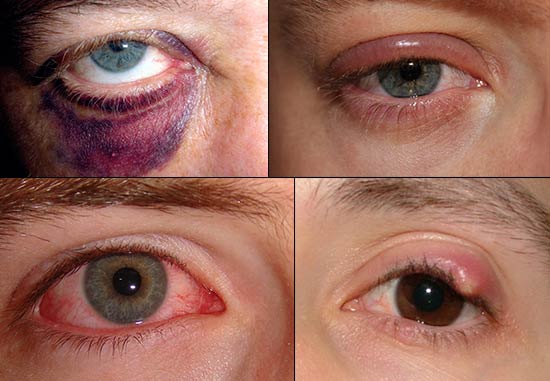Home Remedies for Simple Eye Problems
Make sure to like Living Green and Frugally on Facebook, Shop at Amazon to help support my site and explore our PINTEREST BOARDS for innovative ways you can become self-sufficient.
Eye problems can be both painful and inconvenient, but many minor issues can be managed at home with simple remedies. In this article, we’ll explore home treatments for common eye conditions such as black eye, pink eye, dry eyes, and eye strain. However, always remember to consult a healthcare professional if symptoms persist or worsen.
Black Eye
A black eye, also known as a shiner, typically results from trauma to the eye area, causing bruising and swelling. Here are some home remedies to help alleviate the symptoms:
1. Cold Compress
Apply a cold compress to the affected area as soon as possible after the injury. This can help reduce swelling and numb the pain. Use a cloth-wrapped ice pack or a bag of frozen vegetables for 15-20 minutes every hour for the first 24-48 hours.
2. Elevation
Keep your head elevated, especially when sleeping. This helps reduce swelling by allowing fluids to drain away from the injured area.
3. Arnica Gel
Arnica gel, available in most pharmacies, is known for its anti-inflammatory properties and can help reduce bruising. Apply it gently to the affected area as directed.
View this post on Instagram
Pink Eye (Conjunctivitis)
Pink eye is an infection or inflammation of the conjunctiva, the membrane covering the white part of the eye and the inside of the eyelids. It can be caused by bacteria, viruses, allergens, or irritants.
1. Warm Compress
For bacterial or viral conjunctivitis, applying a warm compress can help soothe the discomfort. Soak a clean cloth in warm water, wring it out, and place it over your closed eyelids for 5-10 minutes several times a day.
2. Saline Eyewash
Rinse your eyes with a saline solution to remove irritants and discharge. You can purchase a sterile saline solution or make one at home by dissolving a teaspoon of salt in a cup of boiled, then cooled, water.
3. Avoid Contaminants
To prevent the spread of infection, avoid touching your eyes, wash your hands frequently, and do not share towels, pillows, or makeup.
Dry Eyes
Dry eyes occur when your eyes do not produce enough tears or when the tears evaporate too quickly. This can lead to discomfort and vision problems.
1. Artificial Tears
Over-the-counter artificial tears can provide relief by lubricating the eyes. Use them as needed throughout the day.
2. Humidifier
Using a humidifier can add moisture to the air, which helps prevent your tears from evaporating too quickly, especially in dry indoor environments.
3. Omega-3 Fatty Acids
Incorporate omega-3 fatty acids into your diet through foods like fish, flaxseed, and walnuts, or consider supplements. Omega-3s can help improve tear production and eye health.
Eye Strain
Eye strain is often caused by prolonged use of digital screens, reading without breaks, or exposure to bright lights.
1. 20-20-20 Rule
Every 20 minutes, take a 20-second break and look at something 20 feet away. This simple practice helps reduce eye fatigue.
2. Adjust Lighting
Ensure your workspace is well-lit to avoid glare and reduce strain. Use ambient lighting rather than harsh fluorescent lights.
3. Blink Frequently
Blinking helps keep your eyes moist. Make a conscious effort to blink more often, especially when using screens.
Styes
A stye is a painful, red bump that forms on the edge of the eyelid, caused by an infection of the oil glands.
1. Warm Compress
Apply a warm compress to the stye for 10-15 minutes, 3-4 times a day. This can help the stye to drain naturally by softening the oil gland blockage.
2. Tea Bag Compress
Black tea bags have antibacterial properties and can help reduce swelling. Steep a black tea bag in hot water, let it cool, and place it over the stye for 5-10 minutes.
3. Avoid Squeezing
Do not try to squeeze or pop the stye, as this can spread the infection and worsen the condition.
4. Maintain Eyelid Hygiene
Keep the affected area clean by gently washing your eyelid with mild, tear-free baby shampoo diluted in water. Use a clean, soft cloth to gently wipe the eyelid.
5. Coriander Seeds Wash
Boil a teaspoon of coriander seeds in a cup of water. Strain the solution, let it cool, and use it to wash the affected eye. Coriander seeds have antibacterial properties that can help reduce the infection.
Medical Disclaimer
This article is for informational purposes only and does not constitute medical advice. While home remedies can be helpful for minor eye issues, it is important to seek professional medical advice if you experience severe symptoms, worsening conditions, or if your symptoms do not improve with home treatment. Always consult with a healthcare professional before trying any new treatments, especially if you have underlying health conditions or are taking other medications.
By taking these precautions and using these remedies, you can manage minor eye problems effectively at home. However, your eye health is crucial, and professional guidance is always recommended for any concerns.
